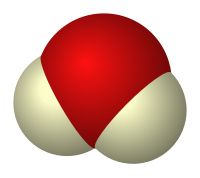
Photo from wikipedia
Significant lifetime enhancement, up to an eight-fold increase in T90, has been demonstrated in blue organic light-emitting diode (OLED) devices through the deuteration of host and hole transport materials. We… Click to show full abstract
Significant lifetime enhancement, up to an eight-fold increase in T90, has been demonstrated in blue organic light-emitting diode (OLED) devices through the deuteration of host and hole transport materials. We observed a progressive increase in T90 using a series of anthracene-based hydrocarbon hosts with incremental deuteration in the emitting layer. In addition, we realized further lifetime improvement using a deuterated hole-transport layer along with the deuterated emitting layer. To elucidate the deuteration effects, we utilized laser desorption/ionization-time-of-flight (LDI-TOF) mass spectrometry for in situ UV irradiation to induce photodegradation and immediate chemical analysis of the resultant photodegradation species. Adducts between the host and moieties from transport materials were identified in UV-degraded films comprising a mixture of host and transport materials, indicating that similar species could be produced in OLED devices using these materials. Deuteration, in effect, mediated the formation of these adduct species, presumably electroluminescence quenchers, and thus improved the device lifetime. An approximate agreement was obtained between the kinetic isotope effect of the photodegradation reactions and the enhancement in device lifetime with deuteration.
Journal Title: ACS applied materials & interfaces
Year Published: 2023
Link to full text (if available)
Share on Social Media: Sign Up to like & get
recommendations!